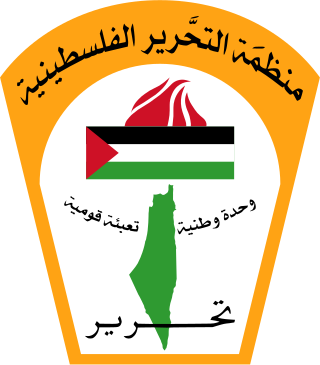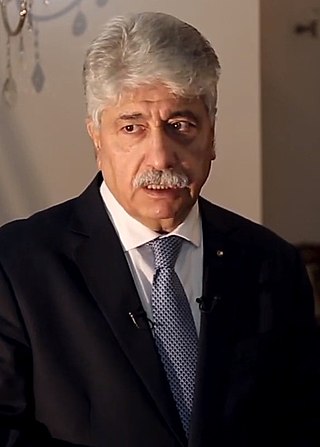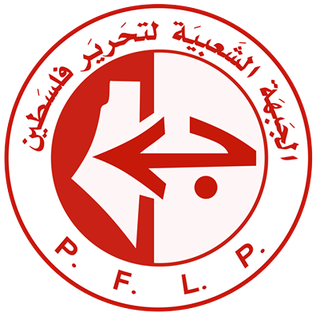
Fatah,formally the Palestinian National Liberation Movement,is a Palestinian nationalist and social democratic political party. It is the largest faction of the confederated multi-party Palestine Liberation Organization (PLO) and the second-largest party in the Palestinian Legislative Council (PLC). Mahmoud Abbas,the President of the Palestinian Authority,is the chairman of Fatah.

The Palestinian Authority,officially known as the Palestinian National Authority or the State of Palestine,is the Fatah-controlled government body that exercises partial civil control over the Palestinian enclaves in the Israeli-occupied West Bank as a consequence of the 1993–1995 Oslo Accords. The Palestinian Authority controlled the Gaza Strip prior to the Palestinian elections of 2006 and the subsequent Gaza conflict between the Fatah and Hamas parties,when it lost control to Hamas;the PA continues to claim the Gaza Strip,although Hamas exercises de facto control. Since January 2013,following United Nations General Assembly resolution 67/19,the Palestinian Authority has used the name "State of Palestine" on official documents,without prejudice to the Palestinian Liberation Organization (PLO) role as "representative of the Palestinian people".

The Palestine Liberation Organization is a Palestinian nationalist coalition that is internationally recognized as the official representative of the Palestinian people in both the Palestinian territories and the diaspora. It is currently represented by the Palestinian Authority based in the West Bank city of Al-Bireh.

The Palestinian Liberation Front,also known as the Palestine Liberation Front - Abu Abbas Faction or Palestine Liberation Front,is a minor left-wing Palestinian political faction. Since 1997,the PLF has been a designated terrorist organization by the United States and by Canada since 2003. The PLF has also been banned in Japan.

Mahmoud Abbas,also known by the kunya Abu Mazen,is a Palestinian politician who is the president of the State of Palestine and the Palestinian National Authority (PNA). He has been the chairman of the Palestine Liberation Organization (PLO) since 2004,PNA president since January 2005,and State of Palestine president since May 2005. Abbas is also a member of the Fatah party and was elected chairman in 2009.

George Habash was a Palestinian politician and physician who founded the Marxist–Leninist Popular Front for the Liberation of Palestine (PFLP).

Faruq al-Qaddumi or Farouk al-Kaddoumi,also known by the kunya Abu al-Lutf,was a Palestinian politician,who served as the Secretary-General of Fatah until 2009 and Chairman of Fatah's central committee and the Palestine Liberation Organization's political department,operating from Tunisia,between 2004 and 2009.

The Palestinian Democratic Union,generally known as FIDA is a small Palestinian political party active in the Palestine Liberation Organization (PLO) and the Palestinian National Authority (PNA).
The Executive Committee of the Palestine Liberation Organization is the highest executive body of the Palestine Liberation Organization (PLO),and acts as the government of the State of Palestine.

The Alternative or the Alternative List,was an electoral alliance of several socialist Palestinian groups:
The Prisoners' Document,officially the National Conciliation Document of the Prisoners was written in May 2006 by Palestinian prisoners,who were being held in an Israeli jail. The five prisoners who took part in writing the Document were respectively affiliated with Fatah,Hamas,Islamic Jihad,the Popular Front for the Liberation of Palestine (PFLP),and the Democratic Front for the Liberation of Palestine (DFLP).

Nasser Al Qudwa,also spelled Nasser Al-Kidwa is a Palestinian politician. A long-time activist in Fatah,he represented the Palestinian Liberation Organization at the United Nations from 1991 to 2005,when he became the Foreign Minister of the Palestinian Authority. Al Qudwa served in that role until 2006.

China–Palestine relations,also referred to as Sino–Palestinian relations,encompass the long bilateral relationship between China and Palestine dating back from the early years of the Cold War.

Ahmed Majdalani is a Palestinian politician,university professor and researcher. A former Palestinian government minister,he currently serves as Secretary-General of the Palestinian Popular Struggle Front (PPSF) and is a senior member of the PLO Executive Committee which is considered the highest political level in Palestine.

The Popular Front for the Liberation of Palestine is a secular Palestinian Marxist–Leninist and revolutionary socialist organization founded in 1967 by George Habash. It has consistently been the second-largest of the groups forming the Palestine Liberation Organization (PLO),the largest being Fatah.

The Democratic Front for the Liberation of Palestine is a secular Palestinian Marxist–Leninist and Maoist organization. It is also frequently referred to as the Democratic Front,or al-Jabha al-Dīmūqrāṭiyya. It is a member organization of the Palestine Liberation Organization,the Alliance of Palestinian Forces and the Democratic Alliance List.
Dr. Sufian Abu Zaida,also spelled Sufyan Abu Zayda,is a senior Palestinian leader,a member of Fatah and the PLO,and a former Minister of Prisoner Affairs at the Palestinian Authority. From February,2005 until the establishment of the Hamas government,Abu Zayda served in the government of the Palestinian Authority as Minister of Prisoners and ex-Prisoners' Affairs and Minister of Civil Affairs. As Deputy Minister of the Ministry of Civil Affairs (1999–2004),his responsibilities focused on coordination with the Israeli government regarding all the civil aspects of the agreements,especially the movement of Palestinians,international crossing points and coordination between Palestinian ministries and their Israeli counterparts. Among many other activities,he has been active in the Israeli-Palestinian Geneva Initiative,in which "moderates" from both sides argue that it is possible to find a just two-state solution. Dr. Abu Zaida is also an academic scholar and lecturer at several Palestinian and International Universities and the Director of the Masters programs at Al-Quds University.

A series of attempts to resolve the hostility between Fatah and Hamas have been made since their 2006–2007 conflict and the subsequent violent conflict over the Gaza Strip.
The Palestinian Cairo Declaration was a declaration signed on 19 March 2005 by twelve Palestinian factions,including Fatah,Hamas,Islamic Jihad,Popular Front for the Liberation of Palestine (PFLP) and Democratic Front for the Liberation of Palestine (DFLP). The Cairo Declaration affirmed the status of the Palestine Liberation Organization (PLO) as the sole legitimate representative of the Palestinian people through the participation in it of all forces and factions according to democratic principles. The Declaration implied a reform of the PLO by the inclusion in the PLO of Hamas and Islamic Jihad.
The Palestinian cabinet,headed by Prime Minister Rami Hamdallah,announced on 23 June 2016 a decision to hold municipal elections on 8 October 2016. The elections were suspended by the Palestinian Court in early September and in January 2017 they were set to 13 May 2017. They were expected to be the first elections in all of the Palestinian territories since Hamas' takeover of the Gaza Strip in 2007,as Hamas agreed to participate in the local elections and allow them to be held in the Gaza Strip but disagreements between Hamas and Fatah led to Hamas boycotting stating it will participate only after "ending disagreements,achieving reconciliation,and uniting Palestinian institutions,including at the political,judicial,and security levels". The elections were later slated to be held in West Bank in May 2017 and were postponed in Gaza Strip.














